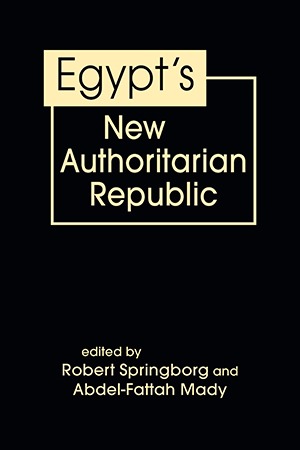Egypt’s New Authoritarian Republic
Editors:
Robert Springborg is nonresident research fellow of the Italian Institute of International Affairs and adjunct professor in the School of International Studies at Simon Fraser University.
Abdel-Fattah Mady is professor of political science and chair of the State and Political Systems Studies unit at the Doha-based Arab Center for Research and Policy Studies.
ISBN: 979-8-89616-019-9
(Boulder, CO: Lynne Rienner Publishers, INC., 2025).


Contents:
How New Is Egypt's New Republic—A.-F. Mady.
The New Republic: Old Vision, Unfulfilled Promises—E.E-D. Shahin.
Using Soft Power to Achieve Legitimacy—M. Affan.
Legitimacy Without Performance: Education as Example—B.K. Rutherford.
In Search of Religious Legitimacy: Reconfiguring the Relationship with al-Azhar—M. Mohamed.
Legitimacy Without Economic Growth—R. Springborg.
Civil-Military Relations: Strategies for Regime Survival—A-F. Mady.
The Police in Egypt's Counterrevolution—H. el-Hamalawy.
Subordinating the Judiciary—W. Salem.
Foreign Policy and the Decline of Regional Power—M. Darwich.
Cross-Border Human Rights Activism—M. El Fegiery.
Reflections on Egyptian Politics Since 2013: Ruler, Regime, and State—N.J. Brown.
Sisi's Fateful Triangle—R. Springborg.
Chapter 7: Civil-Military Relations: Strategies for Regime Survival—
Abdel-Fattah Mady.
ٍSummary
The analysis reveals a multifaceted approach aimed at solidifying the current political regime, with the military playing a central and pivotal role. The central goals of this strategy involve ensuring ongoing military loyalty while maintaining operational efficiency, minimizing the potential for public unrest, and discouraging external supporters from actively backing regime change in Egypt.
Despite ongoing efforts to solidify the current leadership's position, achieving absolute control remains elusive. Power dynamics within the regime still involve multiple actors, and the long-term stability of the regime heavily depends on continued support from the military and security agencies and international support.
Regardless of measures in place to prevent military coups, concessions granted to the military have strengthened its autonomy. This autonomy is further reinforced by the absence of a well-developed and cohesive political party, which necessitates continued reliance on the military and retired officers. The regime also continues to consider that any effective political mobilization by the opposition will result in a return to street protests. And if this occurs, the military will become the primary menace and will not defend the regime against the people.
In addition, the regime recognizes that measures intended to prevent coups do not necessarily guarantee immunity from future military interventions. Underlying structural factors, such as the continued prevalence of authoritarian practices and the lack of a clearly defined presidential succession process, contribute to an environment where coups remain a viable path for ambitious officers to seize power. These concerns give rise to apprehensions regarding the possibility of defection under certain circumstances, such as the curtailment of military privileges due to external financial pressure or a surge in public discontent.
Therefore, the regime's iron fist remains strong and will endure as long as the opposition remains divided. Additionally, the international community's focus on strategic interests within the region, while neglecting concerns about human rights abuses, contributes to the continuation of such policy.
Regarding external support, the past decade has presented a geopolitical landscape that has significantly benefitted the current Egyptian political regime. Several factors have contributed to this phenomenon. The hostility of regional powers towards democratic movements within Egypt and the broader Arab world has led them to provide substantial financial and political support to the current regime.[i] The ongoing conflict in Gaza, particularly the latest wars in 2021 and 2023-2024, have underscored the importance of Egypt's traditional role in mediating between Israelis and Palestinians, making it a valuable strategic partner for the United States. This prioritization of commercial and strategic interests over human rights issues has undoubtedly contributed to the regime's survival and consolidation of power.
One final observation emerges. The regime's approach to addressing the challenging economic situation may not be sustainable. Continued economic decline, unproductive government spending, diminishing external resources, persistent corruption, and a widening wealth gap all pose significant risks. Similar to other Arab states witnessing waves of popular uprisings since 2019, Egypt remains vulnerable to social unrest. Such upheaval, in the absence of a solid, organized opposition, could lead to another military intervention. The potential for the military to repeat past mistakes, either by directly assuming power or failing to create a viable framework for civilian participation, remains a significant concern.
This examination reveals a complex interplay of strategies and challenges surrounding the regime's efforts to consolidate power. While the regime has made strides in achieving certain objectives, significant challenges remain within the domestic and international spheres. Addressing these challenges requires careful consideration of long-term stability and the need for broader participation in the political process.
Overview:
Egyptian President Abd al Fattah el-Sisi has sought to create a "New Republic," a stronger, more authoritarian state capable of positively transforming Egypt's polity, economy, society, and role in the region and the world. Thus far, success has been elusive. Why? And with what consequences for the regime and the country?
These are the two questions at the heart of Egypt's New Authoritarian Republic. The authors effectively combine an overview of the means by which the Sisi government has increased its power with in-depth studies of how that power is exercised, arguing that the regime's performance is undermining rather than bolstering its legitimacy.
© 2007- 2026. All rights reserved. Abdel-Fattah Mady عبد الفتاح ماضي
